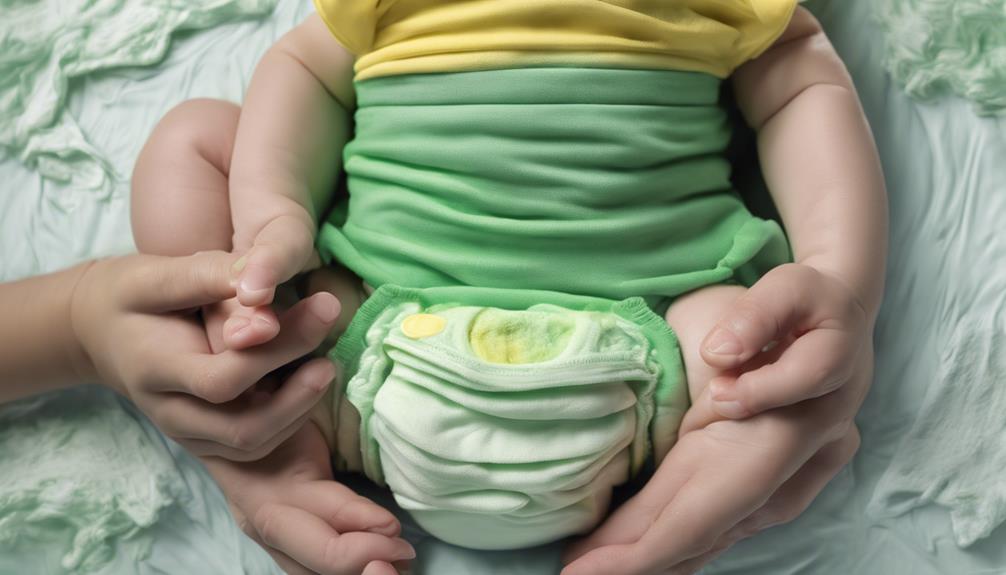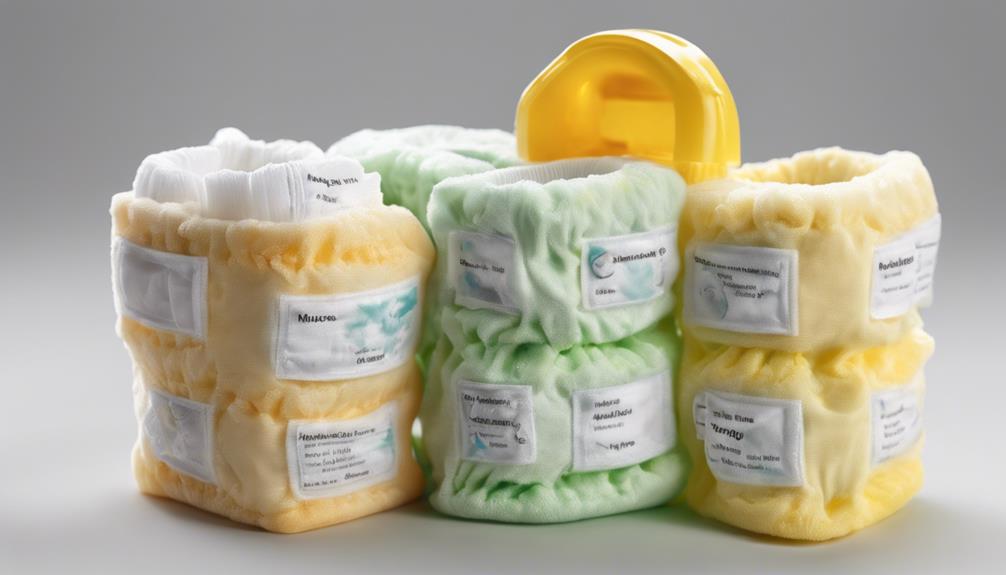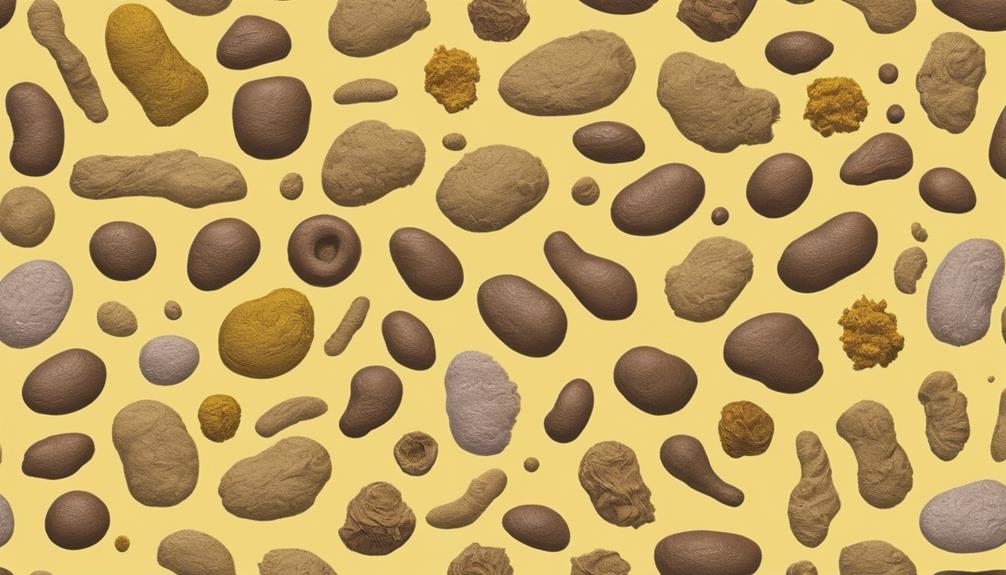When it comes to deciphering the mysteries of mucus in newborn poop, we've all been there – wondering what's normal and what's cause for concern. From the first questionable diaper change to managing the different shades and consistencies, understanding this aspect of baby care can be a real puzzle.
However, armed with the right knowledge and insights, we can make sense of this phenomenon and guarantee our little ones are healthy and thriving. Let's explore the intricacies of mucus in newborn poop together.
Key Takeaways
- Mucus in newborn poop can be normal due to digestive processes.
- Different colors of mucus may indicate infections or allergies.
- Consult a doctor for persistent mucus changes to prevent complications.
- Monitor mucus in diapers for signs of underlying health issues.
Causes of Mucus in Newborn Poop
When examining the causes of mucus in newborn poop, it's essential to understand that various factors can contribute to this occurrence. The intestines of a baby naturally secrete mucus to help with the passage of stool.
For breastfed newborns, their quick digestion process can lead to more mucus in their poop. Infections and allergies are common culprits that can also result in mucus appearing in a newborn's stool.
Additionally, teething can trigger excess saliva production, which might manifest as increased mucus in the baby's poop. In more severe cases, cystic fibrosis, a genetic disorder, can cause heightened mucus production in a newborn's intestines, often accompanied by foul-smelling and greasy stools.
It's of utmost importance for parents to be aware of these potential causes so they can monitor their baby's health and seek medical attention if necessary.
Signs of Mucus in Baby Stool
Examining newborn stool for signs of mucus allows parents to detect potential health issues early on. Mucus in baby stool may present as slimy or jelly-like textures, with clear mucus generally considered guarantee.
However, green or yellowish mucus could indicate infections. In newborns, the presence of meconium, a dark and sticky substance, is common. Excess mucus in baby stool might be a warning sign of underlying problems such as allergies or infections.
If accompanied by a fever, mucus in baby stool becomes concerning and may necessitate medical attention. In rare cases, mucus in baby stool could be a symptom of intussusception, a serious condition where one portion of the intestine folds into another, requiring immediate medical intervention.
Parents should be vigilant for these signs in their baby's stool to address any potential issues promptly and guarantee the baby's well-being.
Handling Mucus in Infant Poop
To effectively manage mucus in infant poop, parents should closely monitor their baby's stool for any changes in consistency, color, or frequency. While mucus in baby poop can be normal and aid in digestion, excessive mucus might signal issues such as infections or allergies. If you notice persistent changes, consulting a doctor is advisable to rule out any underlying problems.
The digestive system of babies is still developing, making them more prone to digestive issues like mucus in their stool. In some cases, mucus in baby poop can be a result of a milk allergy, causing irritation in the gastrointestinal tract. Addressing any concerns promptly, as prolonged mucus in stool could lead to dehydration or indicate infections.
Understanding the potential causes and seeking appropriate guidance from a healthcare provider can help in managing mucus in your baby's poop effectively.
When to Seek Medical Advice

Monitoring your baby's stool for persistent changes, including the presence of mucus, is essential in determining when to seek medical advice regarding their digestive health.
If you notice mucus in your baby's poop along with weight loss or poor weight gain, it could be a sign of an underlying health issue that requires medical attention.
Dehydration is a concern when mucus is present in the stool, especially if accompanied by symptoms like diarrhea.
Severe abdominal pain in conjunction with mucus in your baby's poop should prompt a visit to the doctor for further evaluation and appropriate treatment.
Additionally, if you observe blood in your baby's stool along with mucus, it's important to seek immediate medical attention to address any potential serious conditions.
Keep a close eye on your baby's health, and don't hesitate to consult a healthcare provider if you notice any concerning signs, such as mucus in the stool, weight changes, abdominal pain, or signs of dehydration.
Tips for Managing Mucus in Diapers
Frequently changing your baby's diaper is important in preventing skin irritation caused by prolonged exposure to mucus. To effectively manage mucus in diapers, consider the following tips:
- Use gentle cleaning: During diaper changes, use gentle baby wipes or warm water to clean your baby's bottom. This helps prevent skin irritation and keeps your baby comfortable.
- Apply diaper rash creams: Consider using diaper rash creams or ointments to create a protective barrier on your baby's skin, shielding it from mucus irritation and potential diaper rash.
- Monitor mucus changes: Keep an eye on your baby's mucus in diapers for any alterations in color, consistency, or odor. Changes in these factors could indicate underlying issues that may require attention.
Frequently Asked Questions
When Should I Be Concerned About Mucus in My Baby's Poop?
If we notice mucus in our baby's poop, we should be concerned if it's accompanied by weight loss, blood, severe pain, or changes in behavior. Consulting a healthcare provider is essential for proper evaluation and guidance.
How Can I Help My Baby With Mucus in His Poop?
When mucus appears in our baby's poop, we seek pediatrician advice promptly. Keeping a food diary helps pinpoint triggers. Our healthcare provider guides dietary changes. We stay vigilant for fever, blood, or behavior changes.
Why Does My Newborn Have Stringy Mucus in Poo?
We noticed stringy mucus in our newborn's poop. It's common as their digestive system develops. The mucus helps clear out debris. Breastfed babies may have more due to breast milk. Usually, not concerning, especially during the change to regular stool.
Does Mucus in Baby Poop Mean Milk Allergy?
Yes, mucus in baby poop can indicate a milk allergy. If accompanied by symptoms like fussiness or bloody stool, consulting a healthcare provider is vital. Breastfeeding moms may need an elimination diet, while formula-fed babies might benefit from milk-free formulas.
Conclusion
To sum up, grasping mucus in newborn poop is crucial for parents to guarantee their baby's health and well-being. By recognizing the causes, signs, and management strategies outlined in this guide, caregivers can effectively monitor and address any issues related to mucus in their infant's stool.
For example, Emily noticed excessive mucus in her baby's diaper after starting solid foods, prompting her to consult with her pediatrician and make necessary dietary adjustments. Stay informed and proactive for your baby's digestive health.










